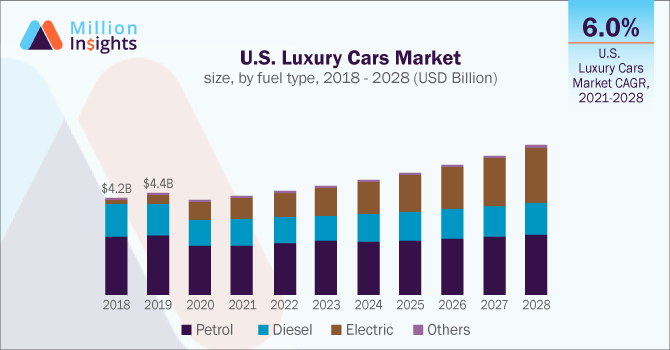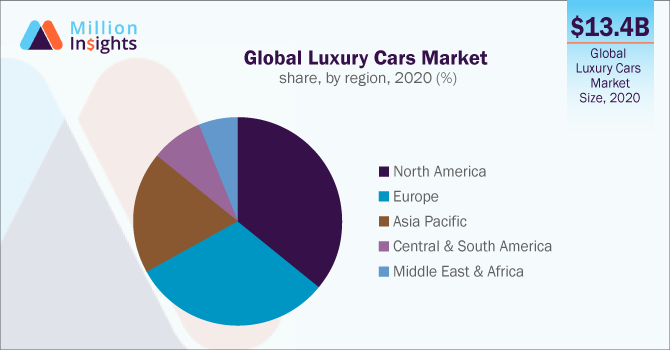The global luxury cars market size was valued at USD 13.4 billion in 2020 and is expected to expand at a compound annual growth rate (CAGR) of 6.7% from 2021 to 2028. The market growth can be attributed to the rising disposable income around the world. The penetration and expansion of global players in the untapped markets and increased product launches will promote the market growth. For instance, Hyundai Motor Company opened a new headquarter in Gurugram, India, on July 27th, 2021.
The market is substantially driven by the extensive research and development activities carried out in the industry. Moreover, Tesla Inc., a manufacturer of luxury electric vehicles, moved towards fully vegan, opting out of leather materials for the interiors of the Model 3 and Model Y. This has been a notable move to help increase the awareness regarding animal welfare and encourage others. As a result, Volvo Cars announced on September 23rd, 2021, that it will be producing a new electric Volvo model completely leather-free.

The market growth is impacted by the shifting consumer preferences, changing regulations, and next-generation connectivity, like the mass automotive industry. The market growth is significantly restrained by stringent regulations and high tariffs. For instance, the Indian government charges 28% GST on luxury vehicles adding to the total taxes, which, in turn, hinders the market growth.
The market for luxury cars observed a significant slump in growth due to the Covid-19 pandemic impact. Car companies around the globe cut their production drastically due to the disruption in the supply chain of car components and the shortage of semiconductors. However, the accelerated vaccination process and restarting manufacturing operations are likely to motivate consumers and increase their interest in car shopping. The market is expected to witness a steady and swift recovery in the coming years.
The petrol segment occupied the largest revenue share of over 45.0% in 2020. Demand for petrol cars continues to soar, even though the petrol prices are surging significantly. Key carmakers have stopped producing diesel cars and electric vehicles are yet to be released worldwide. In addition, petrol cars are more affordable and easy to maintain compared to others. Due to these characteristics, petrol-based cars are still widely used and purchased.
The electric segment is estimated to register the highest CAGR of 14.8% over the forecast period. Electric vehicles run on clean fuel, thereby reducing air pollution and greenhouse gas emission. Key players are planning to stop conventional fossil fuel car production and venture into the production of electric vehicles, which is mostly contributing to the high growth of the segment. For instance, Hyundai Motor Company is planning to only launch electric vehicles from 2025 and phase out gas-powered vehicles by 2030. In addition, Bentley Motors Limited, as reported on November 6th, 2020, plans to go fully electric by 2030, with plug-in hybrid or battery electric cars.
North America dominated the market and held a revenue share of over 35.0% in 2020. The growth of the market can be credited to the higher consumption by the U.S. The strong presence of key market players, higher disposable income, and significant spending on passenger cars are contributing to the regional market growth. Key players have an extensive supply and distribution channel in the region, which contributes to the higher consumption of luxury cars. Tesla, General Motors, and Ford Motors are the prominent players headquartered in the region.

Asia Pacific is anticipated to register a CAGR of 7.2% over the forecast period. The regional market is driven by the significant increase in the consumption of luxury cars in China. China’s import of luxury cars has increased over the years due to favorable economic growth. Increasing disposable income, spending on luxury products, and penetration of the key companies are likely to foster the market growth. For instance, as published on 14th January 2021, Volkswagen Group set up a new regional parts distribution facility in Malaysia at the port of Tanjung Pelepas.
Numerous global and local companies play a significant role in the market growth. The key companies are focused on research and development and product launches to acquire a larger market share. For instance, as reported on 3rd September 2021, Hyundai Motor Company plans to introduce the Genesis luxury car brand in India. Key companies are also focusing on expansion and entering into untapped geographies. For instance, Tesla Inc., an electric vehicle manufacturing company, expanded its manufacturing operations in China and Germany, as reported on February 9th, 2021. It also boosted employment by 47% and sales from 2019 to 2020. Some prominent players in the global luxury car market include: -
|
Report Attribute |
Details |
|
Market size value in 2021 |
USD 14.1 billion |
|
Revenue forecast in 2028 |
USD 22.2 billion |
|
Growth Rate |
CAGR of 6.7% from 2021 to 2028 |
|
Base year for estimation |
2020 |
|
Historical data |
2017 - 2019 |
|
Forecast period |
2021 - 2028 |
|
Quantitative units |
Revenue in USD million/billion and CAGR from 2021 to 2028 |
|
Report coverage |
Revenue forecast, company ranking, competitive landscape, growth factors, and trends |
|
Segments covered |
Fuel type, region |
|
Regional scope |
North America; Europe; Asia Pacific; Central & South America; Middle East & Africa |
|
Country scope |
U.S.; Canada; Germany; U.K.; France; Russia; Italy; China; Japan; India; Brazil; Argentina; South Africa; Saudi Arabia |
|
Key companies profiled |
Stellantis NV; Toyota Motor; Renault; Volkswagen; Hyundai Motor Company; Volvo Car Corporation; Suzuki Motor Corporation; General Motors; Ford Motor Company; BMW Group; Peugeot S.A.; Tesla |
|
Customization scope |
Free report customization (equivalent up to 8 analysts working days) with purchase. Addition or alteration to country, regional & segment scope. |
This report forecasts revenue growth at the global, regional, and country levels and provides an analysis of the latest industry trends and opportunities in each of the sub-segments from 2017 to 2028. For the purpose of this study, Million Insights has segmented the global luxury cars market report on the basis of fuel type and region:
Sign up today.
Call us at +1-408-610-2300 to speak with a
representative.